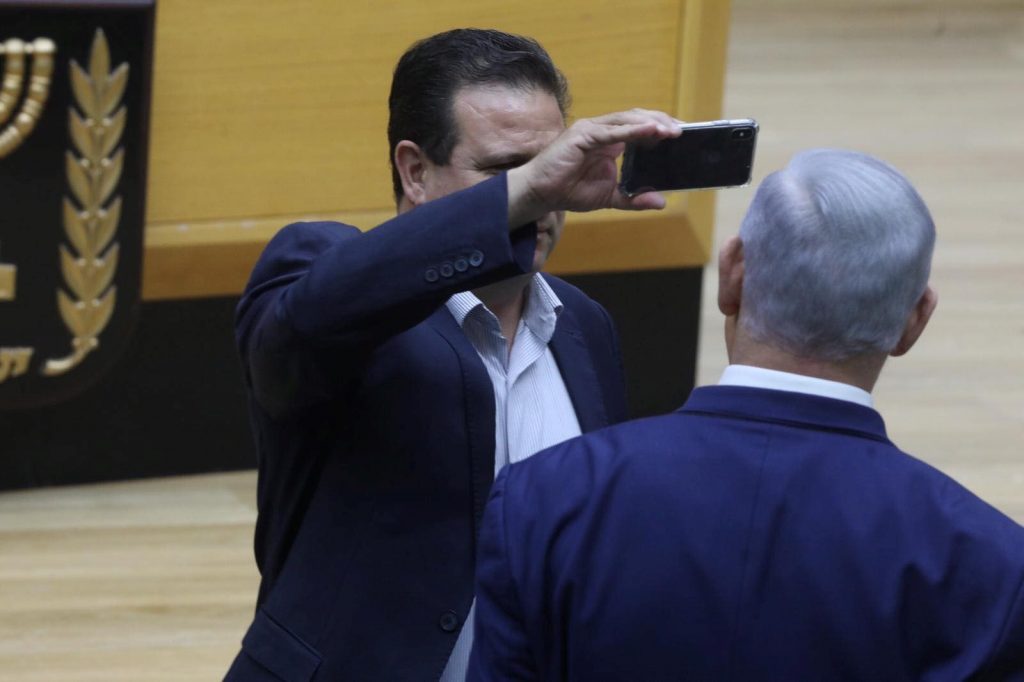Knesset Speaker Yuli Edelstein had Joint List leader MK Ayman Odeh (Hadash) forcibly removed from the Knesset chamber on Wednesday, September 11, during the debate before a vote on the contentious bill that would have allowed cameras to be deployed in polling stations during the general elections on Tuesday, September 17.

MK Odeh and PM Netanyahu, last Wednesday, September 10, in the Knesset plenum during the debate on the provocative and racist “camera bill” (Photo: Knesset)
According to the Arabic-language Communist daily newspaper, Al-Ittihad, Edelstein ordered Odeh’s removal after the Hadash MK accosted far-right Prime Minister Benjamin Netanyahu and positioned a smart phone camera directly in front of the latter’s face. Odeh was ejected from the plenum after apparently beginning to video the prime minister and purportedly calling him a “liar.” Hours later, lawmakers voted down the Likud-led bill following its first reading before the plenum, thereby removing it from the Knesset’s agenda.
Netanyahu’s cabinet had unanimously approved the so-called “camera bill” on Sunday, September 8, with the prime minister insisting the legislation was only intended to prevent voter fraud, which the Likud alleges is rampant in some Arab-majority areas. However, the following day, Monday, the bill failed to gain majority support in the Knesset Regulatory Committee for a motion to fast track it so that the proposed legislation would not have to wait the usual 45 days before being brought before the full Knesset for ratification. In committee, Monday’s vote for and against the expediting of the legislation resulted in a tie of 12-12.
Despite this setback, Netanyahu announced on Tuesday that he still intended to bring the bill to the Knesset floor. If passed, the legislation would have allowed representatives of any political party to bring cameras into polling stations on election day. But it was most blatantly directed against Arab voters, whom the Likud continually and maliciously accuses of voter fraud, the intention being to intimidate as many Palestinian citizens of Israel as possible from exercising their democratic right to vote. The bill faced staunch opposition from the attorney general, the Central Elections Committee, and the Knesset’s legal adviser, as well as critics who say such a move would lead to voter suppression.
On Sunday, the day the bill was approved by the cabinet, the Knesset’s legal adviser, Atty. Eyal Yinon, called it unconstitutional. In his legal opinion presented to lawmakers, he argued that enacting the bill would provide an unfair advantage to the Likud in next week’s election, because that party already has in its possession over 1,000 body cameras that it used to monitor polling station activity in Arab towns during the April 9 election.
During that last vote for the ultimately stillborn 21st Knesset, the Likud had equipped some 1,200 polling officials working at ballot stations in Arab population centers with hidden body cameras to prevent what the party alleged was unchecked fraud in the community. The Central Elections Committee subsequently banned their use. Criticizing the Likud-backed legislative effort as “aberrant and flawed,” Attorney General Avichai Mandelblit last week warned ministers the bill would undermine “the exercise of the fundamental right to vote and the implementation of the legal obligation to conduct free, secret and equal elections.”
Related:
- Hadash MKs: Camera Bill Defeat, Beginning of End for Netanyahu
- Elections Committee Chair: “Likud Cameras at Polls Will Cause Chaos”
- Hadash Testifies against Likud Cameras at Arab Polling Stations
- Likud Plans to Spend $570,000 to Spy Again on Arab Polling Stations
- Hadash Demands Criminal Probe into Likud’s Election Day Spying


